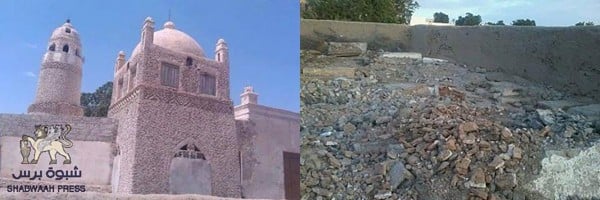
Sources in Yemen have reported that suspected Al-Qaeda militants destroyed the 800-year-old tomb of the Sufi scholar Sufyan bin Abdullah in Al Hota town, Yemen, on January 27, reports Hyperallergic. Bin Abdullah was a revered member of Sultan Saladin’s army, who liberated Jerusalem from the Crusaders in 1187.
Although substantial photo and video evidence provided by several local news outlets appear to depict the holy site’s ruins, it has not been possible to independently confirm its destruction. However, Al-Shorfa reports that members of the Lahij archaeological office claim to have “visited the site and found that the shrine no longer exists.”
Al-Shorfa quoted Yemeni officials who suspect that Al-Qaeda of the Arabian Peninsula (AQAP) was behind the attack “as its elements have carried out similar incursions damaging archaeological and historical landmarks in the past.”
An account of the attack published in the Yemen Press describes a group of over thirty fighters on motorcycles who ransacked the shrine. The combatants allegedly tore down the building, exhumed the tomb and adjacent graves, and discarded the remains on the ground.
The director general of Preaching and Guidance at the Ministry of Endowments and Guidance, Sheikh Jabri Ibrahim, condemned the attack and desecration, saying it was “impermissible in Islam (…) to attack and dig up graves.”
This is the latest example of vandalism of landmark sites in the conflict-stricken region, and demonstrates the challenges many governments face in protecting their cultural and religious heritage from extremists.
The destruction of the Sufi shrine follows a string of attacks on cultural heritage sites across Iraq and Syria by ISIS. (see ISIS Destroying Iraq’s Cultural Heritage One Site at a Time, as well as Isis Destroys Armenian Genocide Memorial In Syria, and ISIS Militiants Demolish Jonah’s Tomb in Iraq)